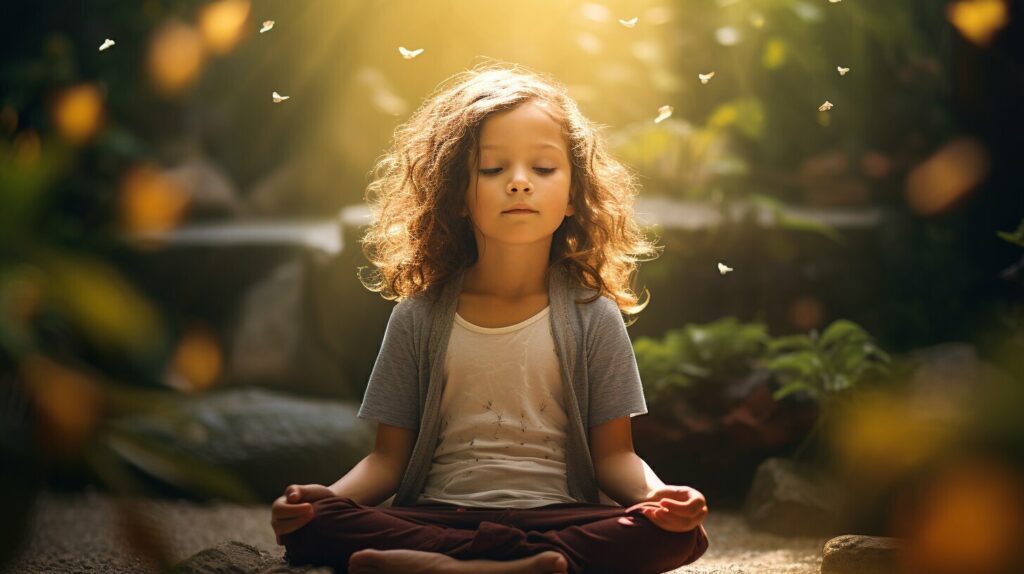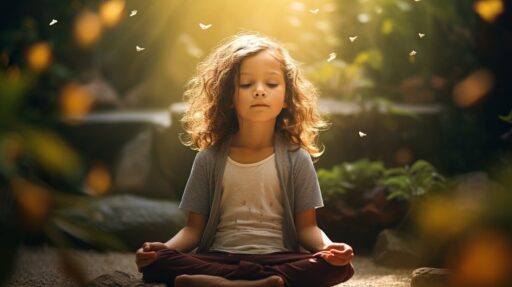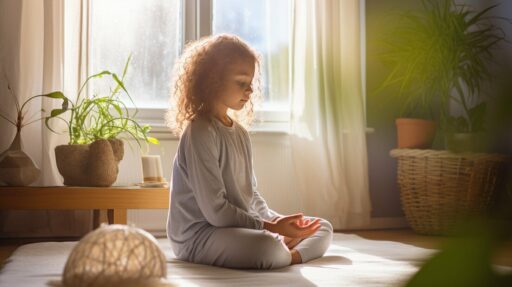Guided Meditation for Children: 7 Powerful Ways to Calm Anxiety and Improve Sleep
Guided meditation for children is a quick, calming bedtime tool. It helps anxious minds slow down, softens big emotions, and makes falling asleep easier. Below you’ll find seven simple techniques, a two-minute script, and expert resources to make tonight’s wind-down peaceful and predictable.
Key Takeaways: guided meditation for children
- Guided meditation for children reduces anxiety and supports steady, healthy sleep.
- Short breathing, visualization, and relaxation exercises teach kids to self-soothe on cue.
- Nightmares often ease when a soothing, repeatable pre-sleep ritual is in place.
- Daily practice builds focus, emotional awareness, and confidence.
- Pair mindfulness with a cozy sleep setup for compounding results.
What is guided meditation for children?
Answer first: It’s a short, story-led practice that teaches kids to notice breath and body so they can relax on cue. Sessions usually run 2–10 minutes with calm narration, nature imagery, and gentle affirmations.
Evidence-based sleep guides show meditation can reduce stress and encourage the body’s relaxation response, especially when used before bed. Explore the science and basic techniques in this overview from the Sleep Foundation: Meditation & Sleep.

1) Calmer bedtimes: how meditation helps kids sleep
Answer first: A brief guided wind-down lowers arousal and cues “sleep mode,” so kids fall asleep faster and wake less.
Try a simple breath count or a “peaceful place” visualization to ease the nervous system into rest. Research-backed guidance highlights paced breathing, mindfulness, and progressive muscle relaxation as effective bedtime tools. See relaxation exercises for sleep from the Sleep Foundation.
2) Easing anxiety and big emotions
Answer first: Meditation gives kids an anchor—breathe, notice, name—that interrupts spirals and calms jitters.
Use a 4-in, 6-out breath and label sensations (“butterflies in my tummy”) to normalize nerves. For broader, kid-friendly habits that support calmer nights, review the Sleep Foundation’s sleep strategies for kids.
3) Building self-esteem with affirmations
Answer first: Repeated, believable phrases help rewrite anxious narratives and steady moods.
Invite your child to pick a “sleep thought” like “I am safe,” “I am calm,” or “I can rest now.” Whisper it with each exhale. Pair with a hand-on-heart gesture to reinforce safety and warmth—especially after tough days.
4) Focus and learning readiness
Answer first: Two minutes of breath attention strengthens the “attention muscle,” which helps with homework and class time.
Use a “five-breath reset” before reading or math. Over time, children recover from frustration faster and re-engage with tasks more smoothly.
5) Lifelong coping tools
Answer first: Mindfulness builds body awareness, emotional vocabulary, and self-regulation that scales with age.
From playground conflicts to teen stress, these skills continue to serve. Consistency matters more than length—short, daily practice wins.

Understanding nightmares (and how meditation helps)
Answer first: Nightmares are common in ages 3–12. A soothing pre-sleep routine lowers stress triggers and may reduce frequency.
Nightmares occur most in late-night REM sleep and often track with stress. Calm, predictable routines and relaxation skills help kids settle faster after waking. See Nightmares in Children from the Sleep Foundation for causes and support.
| Common Trigger | Effect | How meditation helps |
|---|---|---|
| Stressful school day | Nighttime anxiety | Breath + visualization quiet racing thoughts |
| Too much evening screen time | Overstimulation | Body scans slow the nervous system |
| Changes in routine | Unpredictable bedtimes | Daily guided sessions restore rhythm |
The 7 best kid-friendly techniques (with mini scripts)
Answer first: Start tiny—2 to 5 minutes. Use playful imagery and simple counts so kids succeed on night one.
- Calm breathing (“smell the flower, blow the candle”): Inhale through the nose for 4. Exhale through the mouth for 6. Do five rounds.
- Balloon belly: Hands on tummy; “inflate” on inhale, “deflate” on exhale. Add a soft whoosh.
- Peaceful place visualization: “Imagine a cozy cloud/forest/beach. What do you see, hear, smell?” Guide senses for 60–90 seconds.
- Progressive muscle relaxation: Squeeze shoulders/hands/feet for 3 counts; release for 6. Repeat down the body.
- Starfish hand breathing: Trace one hand. Breathe in up a finger, out down a finger—five breaths total.
- Soft-sound awareness: Name three gentle sounds (fan, white noise, distant rain). “Let each sound be a lullaby.”
- Affirmations: Choose one: “I am calm.” “I am safe.” “I can rest now.” Repeat with each exhale.
For more evidence-based practices, the Sleep Foundation’s guide to relaxation exercises covers breathing, body scans, and more.

How to choose the right session for your child
Answer first: Match length and style to age, and let your child help pick the theme or voice.
- Ages 3–6: 2–5 minute, story-driven tracks with animal or nature themes.
- Ages 7–12: 5–10 minute sessions on calm, courage, focus, or kindness.
- Sensitive sleepers: Prioritize slower narration, soft music, and longer exhales.
Build a consistent “sleep ritual” around the session—dim lights, clear the nightstand, and begin 10–15 minutes before lights-out. See examples and wind-down ideas in Parachute Home’s guide to promoting better sleep.
Quick-start two-minute script (read aloud)
Answer first: Short, familiar words plus longer exhales bring faster calm.
“Close your eyes and get comfy. Place a hand on your belly. Inhale through your nose for 1-2-3-4. Now exhale like blowing a candle for 1-2-3-4-5-6. Feel your belly rise like a small balloon… and fall like a gentle wave. Now imagine a cozy cloud carrying you. It’s soft and safe. With each breath out, whisper: ‘I am calm. I am safe. I can rest.’ One more balloon breath… and goodnight.”
Make the bedroom work for you (easy wins)
Answer first: Pair mindfulness with a soothing sleep environment for compounding benefits.
- White noise or soft soundtracks create a stable soundscape and mask jitters.
- Aromatherapy and sleep-friendly essential oils signal bedtime gently.
- Keep kids cool with temperature-regulating bedding and breathable pajamas.
Bonus: eco-friendly vs. conventional bedding
Answer first: Breathable, natural materials can enhance comfort and complement guided meditation for children.
Consider organic bedding for sensitive skin and cooler sleep. If you’re refreshing sheets, look into sustainable bedding and eco-friendly certifications. Choosing organic bedding, sustainable bedding, or eco-conscious sheets pairs nicely with a calm nighttime ritual.
Do you need an app?
Answer first: No app is required—a parent’s calm voice is often best. If you want guidance, lean on research-driven sleep education.
Helpful starting points from the Sleep Foundation: meditation basics, kid sleep strategies, and nightmare support.
FAQ
- What is guided meditation for children?
- A short, calming practice using breath, imagery, and gentle narration to help kids relax, reduce anxiety, and prepare for sleep.
- How often should kids practice?
- Daily is ideal—2–10 minutes at the same time. Consistency beats length.
- Can it help with nightmares?
- Yes. A soothing pre-sleep ritual and relaxation skills can reduce nightmare frequency and help kids resettle faster. See Nightmares in Children.
- Are meditation apps safe for kids?
- Use parent-vetted content, keep sessions short, and avoid bright screens right at bedtime. A parent’s voice works beautifully if you prefer no screens.
- What if my child is too wiggly?
- Try movement first (three wall push-ups, five big stretches), then a 60-second “balloon belly” and a one-line affirmation.
Final Thoughts
Guided meditation for children can transform bedtime from a struggle into a bond-building ritual. Keep it short, playful, and predictable—and pair it with a comfortable sleep setup. For more cozy wind-down ideas, continue exploring Cozy Bed Quarters.
Related Reading
From Cozy Bed Quarters
- Sleep Sound Solutions: White Noise Machines & Sleep Soundtracks
- Organic Bedding Benefits: 7 Surprising Reasons to Choose Natural
- Sustainable Bedding Guide: Eco-Friendly Fabrics and Certifications
Trusted External Resources





